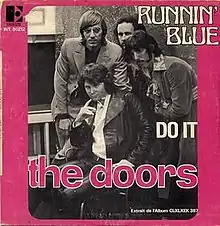Runnin' Blue
"Runnin' Blue" is a song written by guitarist Robby Krieger and performed by the Doors. Elektra Records released it in August 1969 as the fourth single from the band's fourth album The Soft Parade, backed with "Do It". The single peaked at No. 64 on the Billboard Hot 100 chart.[1][2][3]
| "Runnin' Blue" | ||||
|---|---|---|---|---|
 | ||||
| Single by the Doors | ||||
| from the album The Soft Parade | ||||
| B-side | "Do It" | |||
| Released | August 1969 | |||
| Recorded | 1968, 1969 | |||
| Length | 2:33 | |||
| Label | Elektra | |||
| Songwriter(s) | Robby Krieger | |||
| Producer(s) | Paul A. Rothchild | |||
| The Doors singles chronology | ||||
| ||||
Robby Krieger shares vocals with Jim Morrison for the chorus of the track, the only Doors song on which Krieger had a lead vocal while Morrison was alive.[2]
Lyrics
"Runnin' Blue was inspired by the recent death of Otis Redding.[4] Morrison sang the introduction to the song, which referenced Redding's death and was based on a Lead Belly song to which Morrison inserted Redding's name:[2]
Poor Otis, dead and gone
Left me here to sing his song
Pretty little girl with the red dress on
Poor Otis, dead and gone
The lyrics also reference Redding's song "(Sittin' On) The Dock of the Bay."[5] Music critic Bart Testa found it ironic that this Doors song was extolling the dock of the bay, which for Redding was a place of defeat and "where he wasted time having found the struggle for life useless", when earlier Doors songs such as "The End" and "When the Music's Over" call vehemently for revolution.[5] Testa also notes that the line from "Runnin' Blue" stating "Don't fight/Too much to lose" contradicts those earlier songs.[5]
Rolling Stone critic Alec Dubro criticized the poetry of the introduction for being "excessive".[6]
Composition and style
Bluegrass musician Jesse McReynolds plays the mandolin in this song.[4][2] The song begins with a fiddle played by Jimmy Buchanan and builds to a refrain which Testa compares to "Touch Me," the Doors earlier hit from The Soft Parade.[2][5] The refrain of the song refers to "runnin' back to L.A.," and from this Testa sees a progression in the song from starting out in the country, represented by the fiddle and running towards the big city.[5]
AllMusic critic Richie Unterberger described "Runnin' Blue" as "a strange bluegrass-soul blend" and regarded it as one of the weakest songs on The Soft Parade.[7] "Runnin' Blue" was included on the Doors 1972 compilation album Weird Scenes Inside the Gold Mine.[2]
Personnel
The Doors
- Jim Morrison – lead vocals[8]
- Ray Manzarek – keyboards[8]
- Robby Krieger – guitar, co-lead vocals[2]
- John Densmore – drums[8]
Additional musicians
- Harvey Brooks – bass guitar
- Paul Harris – orchestral arrangements[8]
- Reinol Andino – conga[8]
- Jimmy Buchanan – fiddle[2]
- Jesse McReynolds – mandolin[2]
References
- Gaar, Gillian G. (2015). The Doors: The Illustrated History. Voyageur Press. p. 93. ISBN 978-1627887052.
- Weldman, Rich (2011). The Doors FAQ. Rowman & Littlefield. ISBN 978-1617131141.
- "The Doors The 'Hot' 100". Billboard. Retrieved April 14, 2017.
- DeRiso, Nick (July 18, 2016). "50 Years Ago: The Doors Stumble Through the Experimental The Soft Parade". Ultimate Classic Rock. Retrieved November 6, 2019.
- Testa, Bart (October 23, 1969). "Two Discs Extol Warmth of Home". The Morning Call. p. 37. Retrieved November 6, 2019 – via newspapers.com.
- Dubro, Alec (August 23, 1969). "The Soft Parade". Rolling Stone. Retrieved November 6, 2019.
- Unterberger, Richie. "The Doors: The Soft Parade – Review". AllMusic. Retrieved November 6, 2019.
- Botnick, Bruce; Fricke, David (2007). Soft Parade (40th Anniversary edition CD booklet). The Doors. Rhino Records.